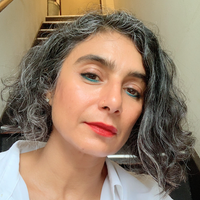On finding inspiration in nature
Prelude
Andrea Barrett is the author of nine previous works of fiction, including the National Book Award–winning Ship Fever and Pulitzer Prize finalist Servants of the Map. She is the recipient of a MacArthur Fellowship, a Guggenheim Fellowship, and an NEA Fellowship, as well as a finalist for the Story Prize and a recipient of the Rea Award for the Short Story. Having lived in Rochester, New York, and western Massachusetts, Barrett now resides in the Adirondacks.
Conversation
On finding inspiration in nature
Author Andrea Barrett on the path to integrating your personal and creative life, the inspiration of the natural world on prose, and revisiting characters in fiction.
As told to Amanda Paige Inman, 1270 words.
Tags: Writing, Beginnings, Inspiration, Day jobs.
What path led you to writing?
It is a long and torturous story. I didn’t write when I was young, I didn’t grow up in a bookish household. I always loved to read but I never thought of being a writer, because I never met another writer. I had a great biology teacher and so I drifted into science. I went to graduate school—briefly—to study zoology. Later, I went back to study medieval history. I didn’t do an MFA or anything like that. By the time I was fooling around with my first novel I was in my late 20s, or early 30s. I was 33 years old when I published my first novel. The first time I met other writers was at the Bread Loaf Writers’ Conference in my early 30s and those were my first workshops. It was incredibly inspiring and that is where I met many generous people that helped me along the way.
I love talking to people that have an “unconventional” path to writing.
It used to be the typical way that people become writers. You read books you love, and you try to write a book you can stand…and if it isn’t good then you read more books you love, and then you try again. It does feel less normal now. When I was an undergraduate we didn’t have writing classes. It’s great that they have these now, but I really missed out on that.
What advice would you give to an aspiring writer without a formal creative writing education?
Don’t discard what you learned in your other life. In my early writing stages I told myself that I shouldn’t write about biology but I found my voice when I was able to integrate my early life with my writing life. The things you know deeply—from driving a truck, environmental history, to construction—is a place you can write from. I think it is a huge asset for writers to have lived some life that is not a writing life. There is a fine distinction there. Sometimes people start writing when they are young and they will take a year to work, but only with the intent to use the experience as material for their writing. So in a sense, they are not actually doing it. When I was working in a box factory, that was my life, that was what I thought I was doing. I had 13 jobs in my first 10 years out of college and I thought all of them was what I would end up doing. I was living within that moment. Having a lot of years without writing shaped me profoundly. I had to experience the uncertainty of not feeling at home in the world, and try to figure out who I was before I began to write seriously. I had to find my way.
Your experience in your science life really shows up in your writing. The scientific and the natural world inform the emotional realities of your characters. I would like to hear your thoughts on the relationship between the natural world, science, and your creative process.
I love the natural world. It is a big part of my life. I want my writing to make people feel what it’s like to inhabit that world and feel what it is like to see the world through that lens. The way you think about your emotional life is colored by your experiences in the natural world and that is why I write fiction about it. I wish I could write poetry about it. In a perfect world, I would like to think that the natural world sinks into me so deeply, and I’ve been in it so long, that it is my way of making metaphor, images, emotions and organizing the sound and shape of prose. I am not trying to tell the reader about it, I want the reader to feel the natural world.
Speaking of the shape of prose, I think it also sinks into the shape of your stories as well. There are patterns that show up in your stories and characters’ lives. Similar to patterns that naturally happen in nature, there were small recurrences that happened across generations within a family, or characters that are in the same place across time. I wanted to hear your ideas about inheritance. What do we inherit from family and place?
That is a huge part of what shapes my worldview as well as my writing. It’s no surprise that I am a big fan of Darwin and I’ve been thinking about heredity for a long time. I am constantly mulling over how that affects my characters. What do they inherit? What do they pick up from the places that they live? What is nature and what is nurture? What is culture and what is biology? Sometimes I am trying to set my characters in motion in a way that will make the reader think about those things. I can’t answer any of those questions, but if I am lucky and I’ve done a good job, I can make the reader wonder about those things.
Did you know you were going to revisit these same places when you were first writing about them.
I didn’t know anything, [laughs] seriously. All of these things have grown over six books. I was just making stories and that is the only way I work. I never knew that one story would lead to another, let alone that the books would lead to each other. I am a very intuitive writer and that’s a blessing in some ways and a curse in others. I can’t plan on where I am going, I can’t answer intelligently when people ask me what I am going to work on next.
So when you are beginning a story, where do you start?
Sometimes I start a story with just a feeling. Often it is a place or an image. A house, a tree, a mountain. A sentence or a phrase. Sometimes it is like a line of music, a tone. Sometimes it is a character. It’s happened a couple of times that I start from one of those places and work for a few days or weeks and one morning I will wake up with a sentence that makes me realize that one of my new characters could be related to one of the characters I wrote about 45 stories ago. Something in my unconscious mind will weave those people together and put them in the same place. Sometimes I find a way to cast an image or tone, attach it to a character I’ve already worked with. Something in me wants to connect layers over time… not just families but friendships over time, over generations. I think a lot about how we build community over time or place. Sometimes it seems that I can’t work on a project really hard without connecting it to this gigantic web that I constructed over the years.
It sounds as if these characters are alive.
For me they are. My characters are all still alive in my head. I keep them parked in a back room. I just open a door when I need them, whenever it is time to play.
Andrea Barrett recommends:
“Blue Prelude” as covered by Peggy Lee and George Shearing
Riding cross-country on a motorcycle
reading Proust for the third time
Martin Johnson’s Heade’s hummingbird paintings
chocolate bourbon cake
- Name
- Andrea Barrett
- Vocation
- writer
Some Things
Pagination



